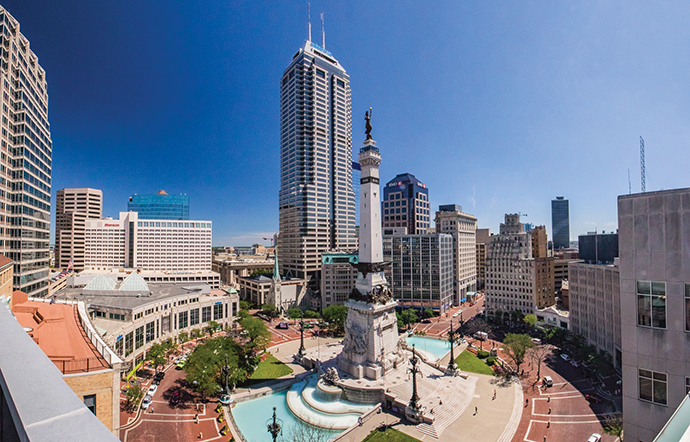How do you compete in business if you’re not the biggest kid on the block? In the case of smaller and more agile tech firms, you do it by outsmarting the heavyweights.
When Michael Burton’s rapidly growing Lev needed an outpost in the eastern half of the U.S., he chose Indianapolis. A Salesforce consulting firm with offices in Arizona and Texas, Lev announced on January 24 that it would hire 70 people to add to its 60-person workforce in Indiana’s capital city. The firm also signed a lease for about 17,000 sq. ft. (1,580 sq. m.) in Regions Tower, where the company will have room for up to 200 workers. Salesforce Tower, located a short walk from Lev’s growing office in Regions Tower, is where Salesforce aims to invest some $40 million over the next 10 years, and grow its own headcount to 800 by 2021.
“I was the first Indy-based Lev employee, and since 2016, we have worked out of five different temporary offices,” Burton said. “It’s exciting to finally move into our Indy home and to continue to fulfill our promise to add up to 175 jobs in Indianapolis. We have a great team in place, and I’m looking forward to adding more experience to that team.”
Indiana garnered 93 venture capital deals last year, good for a total of $368 million.
Lev is not alone. All around Indiana, there’s ample evidence that small business is big business. On February 1, the Indiana Economic Development Corp. announced that 2018 was a record-breaking year for small business growth in the state. The Indiana Small Business Development Center and the Indiana Procurement Technical Assistance Center helped launch 318 small businesses and secure $86.3 million in government contracts for Indiana businesses, respectively, in 2018. Together, the Indiana SBDC and Indiana PTAC helped small businesses create 1,554 new jobs statewide.
“With more than 508,000 companies employing 1.2 million Hoosiers, small businesses play a critical role in maintaining long-term economic growth in Indiana and supporting good jobs in our communities,” said Elaine Bedel, president of IEDC.
These include companies like Heliponix, an Evansville-based ag-bioscience startup which developed and commercialized an indoor plant-growing system called GroPod while its founders were at Purdue University. The firm used the Southwest Indiana SBDC to prepare its business plan and financial projections along with a successful loan application through the Vectren Foundation loan program established by the Indiana utility.
Giving it the Old College Try
Purdue is a big player in small business growth throughout Indiana. On January 10, the West Lafayette–based school announced that it had achieved a milestone in startup creation in 2018 with 223 startups, more than $350 million in funding and investments generated, and more than 300 new jobs.
“Purdue has a 150-year history of producing world-class research,” Purdue University President Mitch Daniels said. “Five years ago, we set out to establish an equally strong commercialization ecosystem to ramp up the translation of this research into the market and into real-world solutions. These efforts are clearly beginning to bear fruit, and to encourage us that these gains are just a beginning.”

The question is, why do so many small ventures choose Indiana as their home base? For example, small tech firms like FreightRover and Socio recently joined Lev in expanding in Indianapolis. Burton helped answer this question when he sat down for an interview with the Indy Chamber. When Lev needs to expand, he said, “We look at two things — be close to Salesforce and be close to talent. With the many great universities here — Purdue, Indiana, among others — this is a no-brainer for us.”
Even though Lev only entered the market three years ago, Indy already ranks as the firm’s fastest-growing location. “This is outpacing our growth at our offices in Arizona and Texas,” he said. “We get help in getting training grants. That allows us to bring in people who are recent college grads and train them. We get them up to speed faster.”
Maureen Donohue Krauss, chief economic development officer for the Indy Chamber, says there are several reasons why small-to-medium-sized firms like Lev succeed in the Indy region. “We have the right culture for the small and medium-sized companies,” she says. “There is a great support climate for entrepreneurial growth here. When ExactTarget sold to Salesforce a few years ago for $2.5 billion, the principals stayed here and now they are growing smaller firms in this region. Scott Dorsey stayed here and started a venture fund to grow other tech firms here. It is pretty easy to succeed in Indy.”
Still, no one would choose a place without capable workers, and that’s where Indy excels, notes Krauss.
The Indiana Small Business Development Center and the Indiana Procurement Technical Assistance Center helped launch 318 small businesses and secure $86.3 million in government contracts for Indiana businesses, respectively, in 2018.
“When we were selected as one of the 20 finalists for Amazon HQ2 last year, that gave us a bump,” she says. “Others may have been surprised, but we weren’t. We graduate an incredible amount of talent that they need — whether that be from Notre Dame, Purdue, Indiana, Butler or others. The reality is that we are very appealing to Amazon and other tech companies. The second largest Salesforce talent in the world is based here now.”
In fact, Inc. magazine recently named Indianapolis as one of the 50 Best Places for Starting a Business in America. Ranking Indy at No. 25, the publication said, “With its low cost of living and cultural flair, both 20-somethings and tech companies are giving into the pull of this Midwestern city.” The report went on to say: “The arrival of Salesforce has been a boon for the city – not just for the promise of $40 million in investment, but also for putting a major software company’s name on the city’s and state’s tallest building.”
Venture Capitalists Fulfill Hoosier Dreams
Add to that success the fact that Infosys, an Indian outsourcing tech company, plans to add 2,000 jobs by 2021, and you can see why Indy joined Chicago and Columbus, Ohio, as the only three Midwestern cities to make Amazon’s cut of 20 finalist cities.
Perhaps the world’s richest person, Amazon’s Jeff Bezos, found out that the Indianapolis-Carmel-Anderson MSA now ranks as the No. 8 metropolitan area in the nation in overall economic strength, according to the updated 2019 POLICOM index — up from No. 49 just four years ago.
“When we were selected as one of the 20 finalists for Amazon HQ2 last year, that gave us a bump. Others may have been surprised, but we weren’t.”
Even without landing Amazon, the Indy region recorded its best year ever for jobs and capital investment in 2018, securing 10,548 new jobs and $2.4 billion in investment.
Still, it would be a mistake to think that startup success and small business growth are confined to Indy. Statewide, there’s plenty of evidence supporting a tech renaissance. ClearObject CEO John McDonald, for instance, announced in January that he had secured new owners for his Fishers-based company that specializes in Internet of Things integration. “If cash is oxygen,” he said, “we just strapped on a big oxygen tank.”
And McDonald is far from alone. Pitchbook and the National Venture Capital Association report that Indiana garnered 93 venture capital deals last year, good for a total of $368 million.
Small ventures, it would seem, are big business in Indiana.

